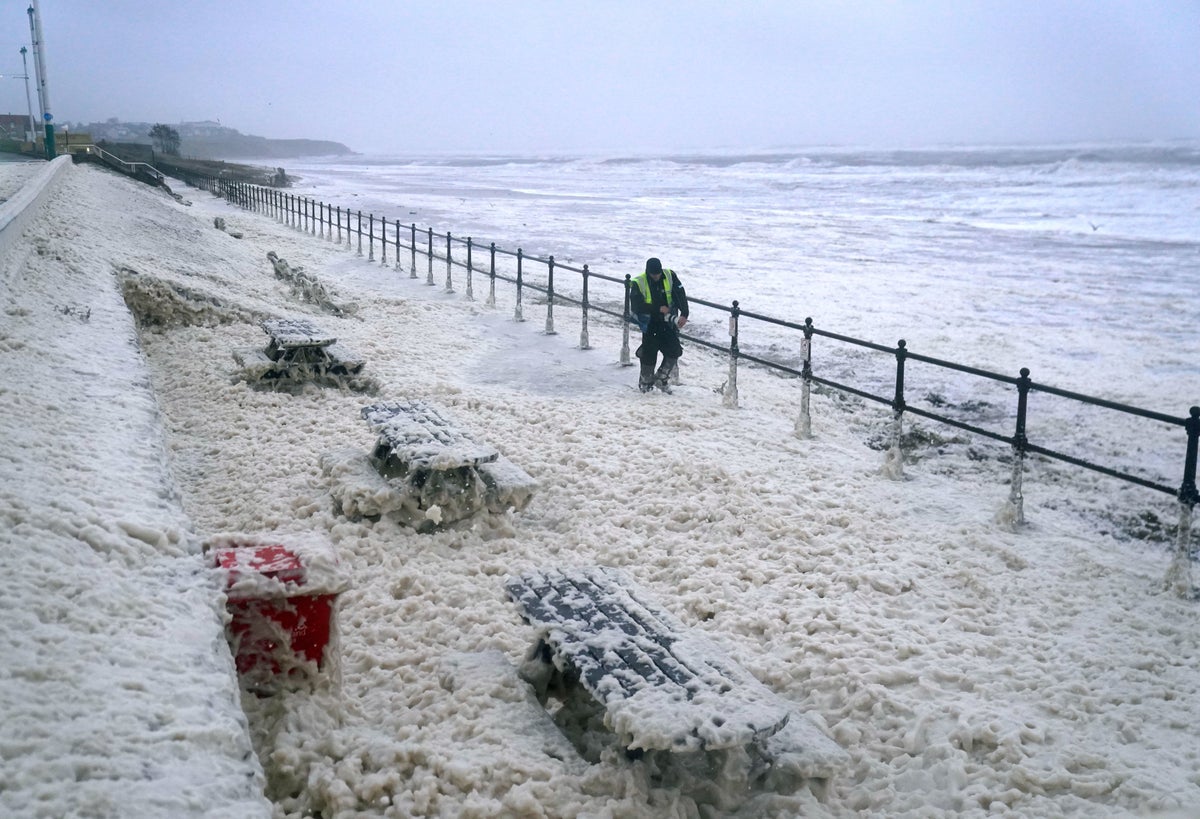
Severe rainfall and winds from Storm Babet have caused devastating flooding in Ireland and Scotland in the last couple of days, prompting evacuations and dramatic rescues.
The rainfall, which is expected to last till the weekend, has flooded houses, damaged roads and railways, swept away unharvested crops, and killed a 57-year-old woman and a man whose van was hit by a falling tree in Scotland.
The rain is accompanied by very strong winds with their own amber warning while yellow warnings cover almost the entire UK.
“I’ve never seen anything like it,” Jill Scott, councillor for Brechin and Edzell towns in Angus, Scotland, said. “There will be hundreds of houses flooded.”
“It’s unbelievable. It’s devastating. I don’t know what the council’s going to do to be honest – how many people they are going to have to rehome.”
The severity of this storm is signalled by the fact that a rare red warning, the highest alert system, was issued by the Met Office earlier this week, and has since been expanded to more areas.
The last time a red alert was issued by Met Office was during Storm Dennis in 2020, which left at least three people dead and submerged streets in parts of England, Wales and Scotland.
Experts say Babet is an “extraordinary” storm which has been fuelled by several factors, including the impact of a typhoon on jet stream and rising temperatures.
“Storm Babet is an extraordinary piece of weather caused by the interaction of a number of linked conditions across the world,” Dr Hannah Cloke, professor of hydrology at the University of Reading, said.
“The jet stream, which plays such an important role in the weather in Europe, has been squeezed into a weird position, partly as a result of a powerful typhoon that hit Japan last week.”
“An active storm has moved up over the Bay of Biscay, and is now due to slow over the east of Britain, dumping an enormous amount of rain over eastern parts of Scotland,” she added.
While it is too soon to know what role climate crisis played, scientists from University of Reading say existing research shows how increased global temperatures are making rainfall more intense.
“Climate change has caused seas and air to be unusually warm,” Dr Cloke says.
“Warmer seas have more dynamic energy which can create more damaging storms, and warmer air can hold more water, leading to higher rates of rainfall.”
“Previous research has also shown that large-scale circulations such as the jet stream may be shifting in speed and direction due to an array of global warming impacts, such as melting ice and warmer oceans.”
Two months worth of rain was expected to fall on Scotland’s already saturated grounds while river levels in the Angus town could reach an “unprecedented” five metres higher than normal, rendering flood defences useless.
Angus Council, responsible for a large area in the east of Scotland north of Dundee, said residents in 335 homes in Brechin and a further 87 homes in Tannadice and Finavon were asked to evacuate due to risk of severe flooding.
Many others have been asked to stay prepared to leave anytime.
“The risk of flooding is due to these exceptionally high rainfall rates, with rain falling on already wet ground,” Dr Cloke said.
“With the hilly landscape of this part of Scotland, we could see damaging run-off, flash floods, landslips and serious damage caused to buildings and infrastructure,”
“Scotland is used to heavy rain, but these extremely high levels of rain could hit regions which are not adapted for it, and flash floods from rain can hit anywhere.”
Many areas in the UK have become more prone to flooding in recent years. A study carried out by Utility Builder, a UK based energy broker that provides energy procurement services, showed some regions like Sefton in Merseyside, England were 30 per cent more likely to be flooded now than in 2018.
Other towns that showed a 17, 10 and 8 per cent increase in the likelihood of flooding were Wirral, Blackpool and Lancashire.
Experts are advising to keep a flood preparedness plan ready, even if your area hasn’t been flooded before.
“Storm Babet will bring persistent and heavy rainfall to parts of the British Isles and flooding could come from rivers, the sea and also occur suddenly in the form of flash flooding. Having a flood preparedness plan in place can help save lives, property and valuables,” Dr Jess Neumann, associate professor of hydrology at the University of Reading, said.

.jpg?w=600)





